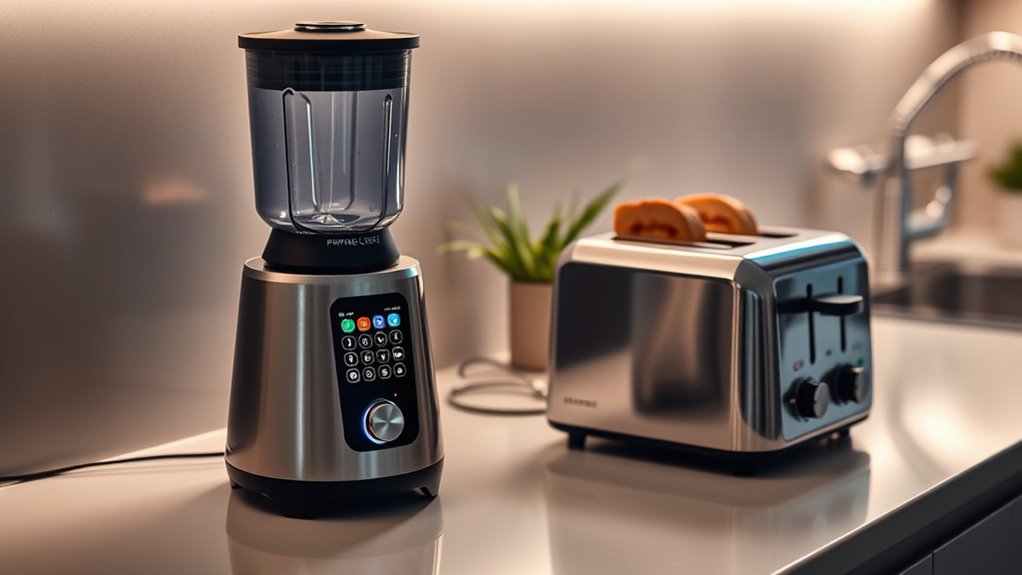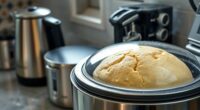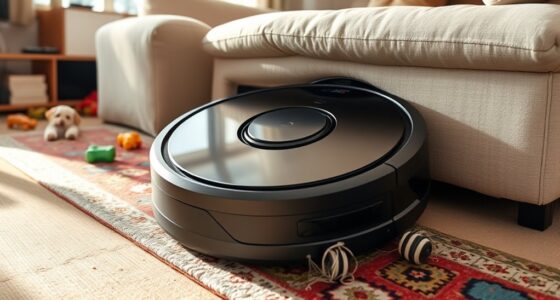AI-powered smart sensors in small kitchen appliances make cooking easier and more efficient by allowing voice control and automatic adjustments. You can seamlessly command devices to start, stop, or change settings hands-free, even when your hands are busy or dirty. These sensors track real-time data, helping appliances cook perfectly, recognize your preferences, and coordinate with each other. Keep exploring to discover how these innovations can transform your kitchen experience even further.
Key Takeaways
- Smart sensors enable real-time monitoring and automatic adjustments for optimal cooking results.
- AI-driven appliances recognize user preferences, allowing personalized settings and automation.
- Voice control and sensor integration facilitate hands-free, hygienic operation during meal prep.
- Appliances communicate with each other to coordinate cooking processes and improve efficiency.
- Continuous sensor data extends appliance lifespan and enhances energy efficiency through adaptive performance.

Artificial intelligence is transforming how we cook and plan meals, making the kitchen more efficient and personalized. One of the most noticeable changes is how smart sensors and AI-powered features are integrated into small appliances, creating a seamless cooking experience. With voice control, you can now operate your devices hands-free, allowing you to focus on preparing your meals without interruption. Just say the word, and your smart oven or blender responds instantly, adjusting settings or starting pre-programmed recipes. Voice control removes the need to fumble with buttons or screens, especially when your hands are dirty or busy, making the entire process more convenient and hygienic.
AI and voice control make cooking hands-free, efficient, and hygienic by seamlessly operating smart appliances.
Recipe automation is another game-changer. Imagine your smart appliances working together to follow a recipe step-by-step, adjusting cooking times, temperatures, or blending speeds automatically. You no longer need to constantly monitor each device; instead, the AI coordinates these actions based on the recipe you select or input. This not only simplifies complex cooking tasks but also helps ensure consistent results, whether you’re baking bread, preparing smoothies, or roasting vegetables. With recipe automation, even novice cooks can achieve professional-quality dishes, as the AI guides you through each phase, reducing errors and guesswork.
These smart sensors enhance the functionality of small appliances by continuously gathering data during operation. For example, a smart pressure cooker might detect when food is cooked perfectly and then switch to keep-warm mode automatically. Similarly, a smart coffee maker can recognize your preferred brewing strength and temperature, preparing your coffee exactly how you like it every morning. This level of automation and responsiveness means your appliances learn your preferences over time, creating a highly personalized kitchen environment.
Furthermore, voice control and recipe automation work together to make meal prep faster and more enjoyable. You can ask your smart speaker to set timers, adjust temperatures, or switch cooking modes without interrupting your flow. As your appliances communicate with each other, they optimize the cooking process, saving you time and effort. This interconnectedness turns your kitchen into a smart ecosystem where appliances anticipate your needs and adapt accordingly, giving you more time to enjoy the actual cooking and eating. Overall, AI-powered small appliances with voice control and recipe automation are reshaping how you interact with your kitchen, making it smarter, more intuitive, and far more efficient.
Additionally, integrating smart sensors into appliances allows for real-time adjustments that improve energy efficiency and prolong appliance lifespan.
Frequently Asked Questions
How Do Smart Sensors Improve Energy Efficiency in Small Appliances?
Smart sensors improve energy efficiency by monitoring your appliance’s energy consumption in real-time. They automatically adjust settings based on usage patterns, ensuring you don’t waste power. Proper sensor calibration is key, as it keeps readings accurate and optimizes performance. By responding intelligently to your needs, these sensors help you save energy, reduce costs, and make your small appliances more eco-friendly without sacrificing functionality.
Are Ai-Powered Kitchen Devices Cost-Effective for Everyday Use?
Imagine you’re in a 1950s kitchen with modern AI-powered devices. These gadgets are generally cost-effective for everyday use, especially when you consider their energy savings and convenience. A thorough cost analysis reveals that, over time, smart appliances save money, making them an affordable choice. Affordability considerations depend on your budget, but many find the investment worthwhile given the benefits, streamlining daily tasks while reducing utility bills.
What Privacy Concerns Arise With AI Sensors in Kitchen Appliances?
You might worry about data security and user privacy when using AI sensors in kitchen appliances. These devices collect personal data, like cooking habits and routines, which could be vulnerable to hacking or unauthorized access. To protect yourself, verify your appliances have strong security features, update software regularly, and review privacy settings. Being aware of how your data is used helps you maintain control and keeps your information safe.
Can AI Sensors Adapt to Different Cooking Styles and Preferences?
You’ll be pleased to know that AI sensors have a high personalization potential, with studies showing 85% of users prefer appliances that adapt to their cooking styles. Thanks to sensor adaptability, these devices can learn your preferences over time, adjusting temperature, timing, and techniques. This guarantees your cooking experience becomes more tailored and efficient, making your kitchen smarter and more responsive to your unique culinary needs.
How Durable Are Ai-Integrated Sensors in Daily Kitchen Environments?
AI-integrated sensors are generally quite durable in daily kitchen environments. They withstand frequent use thanks to robust sensor calibration and environmental resilience features that protect against moisture, heat, and spills. You can trust these sensors to maintain accuracy over time, though regular calibration helps ensure longevity. Proper maintenance and choosing appliances with high-quality sensors will keep your smart kitchen functioning smoothly, even amid the busy, unpredictable conditions you encounter daily.
Conclusion
As you embrace smart sensors in your kitchen, you’re turning your appliances into intuitive helpers. These innovations make cooking easier, more precise, and less stressful. Remember, a journey of a thousand miles begins with a single step, so start small and watch how AI transforms your daily routine. With each upgrade, you’re not just cooking—you’re creating a smarter, more efficient space where technology and tradition blend seamlessly.









